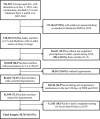Effect of Dual Use of Veterans Affairs and Medicare Part D Drug Benefits on Antihypertensive Medication Supply in a National Cohort of Veterans with Dementia
- PMID: 30328097
- PMCID: PMC6235809
- DOI: 10.1111/1475-6773.13055
Effect of Dual Use of Veterans Affairs and Medicare Part D Drug Benefits on Antihypertensive Medication Supply in a National Cohort of Veterans with Dementia
Abstract
Objective: To evaluate the effect of dual use of VA/Medicare Part D drug benefits on antihypertensive medication supply in older Veterans with dementia.
Data sources/study setting: National, linked 2007-2010 Veterans Affairs (VA) and Medicare utilization and prescription records for 50,763 dementia patients with hypertension.
Study design: We used inverse probability of treatment (IPT)-weighted multinomial logistic regression to examine the association of dual prescription use with undersupply and oversupply of antihypertensives.
Data collection/extraction methods: Veterans Affairs and Part D prescription records were used to classify patients as VA-only, Part D-only, or dual VA/Part D users of antihypertensives and summarize their antihypertensive medication supply in 2010: (1) appropriate supply of all prescribed antihypertensive classes, (2) undersupply of ≥1 class with no oversupply of another class, (3) oversupply of ≥1 class with no undersupply, or (4) both undersupply and oversupply.
Principal findings: Dual prescription users were more likely than VA-only users to have undersupply only (aOR = 1.28; 95 percent CI = 1.18-1.39), oversupply only (aOR = 2.38; 95 percent CI = 2.15-2.64), and concurrent under- and oversupply (aOR = 2.89; 95 percent CI = 2.53-3.29), versus appropriate supply of all classes.
Conclusions: Obtaining antihypertensives through both VA and Part D was associated with increased antihypertensive under- and oversupply. Efforts to understand how best to coordinate dual-system prescription use are critically needed.
Keywords: Dementia; Medicare Part D; Veterans; hypertension; medication use.
© Health Research and Educational Trust.
Figures
References
-
- Andersen, R. M. 1995. “Revisiting the Behavioral Model and Access to Medical Care: Does It Matter?” Journal of Health and Social Behavior 36 (1): 1‐10. - PubMed
-
- Blalock, S. J. 2011. “The Theoretical Basis for Practice‐Relevant Medication use Research: Patient‐Centered/Behavioral Theories.” Research in Social Administrative Pharmacy 7 (4): 317‐29. - PubMed
-
- Bryson, C. L. , Au D. H., Young B., McDonell M. B., and Fihn S. D.. 2007. “A Refill Adherence Algorithm for Multiple Short Intervals to Estimate Refill Compliance (ReComp).” Medical Care 45 (6): 497‐504. - PubMed
-
- Buccaneer Computer Systems & Service, Inc . 2013. Chronic Condition Data Warehouse Medicare Administrative Data User Guide.Warrenton, VA: Buccaneer Computer Systems & Services, Inc.
-
- Byrne, C. M. , Mercincavage L. M., Bouhaddou O., Bennett J. R., Pan E. C., Botts N. E., Olinger L. M., Hunolt E., Banty K. H., and Cromwell T.. 2014. “The Department of Veterans Affairs’ (VA) Implementation of the Virtual Lifetime Electronic Record (VLER): Findings and Lessons Learned From Health Information Exchange at 12 Sites.” International Journal of Medical Informatics 83 (8): 537‐47. - PubMed
Publication types
MeSH terms
Substances
Grants and funding
LinkOut - more resources
Full Text Sources
Medical


